Healthy diet, affordable for all – Fuel for the Future
Mahalakshmi Murugesan
Senior Dietitian, Kauvery Hospital, Heartcity, Trichy, India
Fuel for the future with healthy Foods
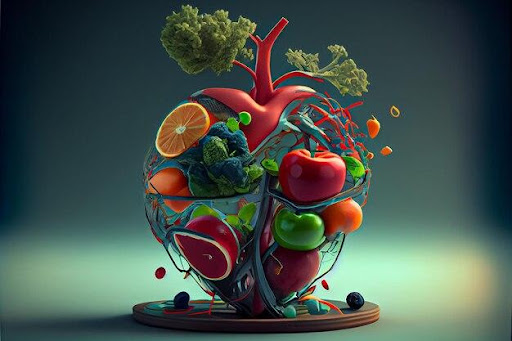
- Eat a variety of foods from all food groups. Fruits, vegetables, grains, protein foods, and dairy all play a role in fueling our bodies.
- Try to eat a diet of mostly plant-based foods and take a modest amount of animal-based products.
- Choose fewer processed foods by prioritising fresh food.
- Choose seafood products from sustainable fisheries.
- Eat locally grown, seasonal food that supports the local economy while offering our bodies the healthiest foods.
What is Nutrition?
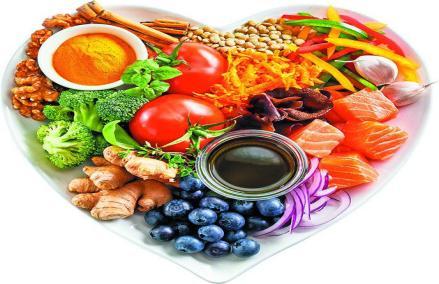
- Nutrition is a method in which the food is consumed by the organisms and utilizing the nutrients from the food.
- Nutrition is the process of taking in food and converting it into energy and other vital nutrients required for life.
- The development of human health is dependent mainly on nutrition. Improved nutrition boosts the immune system, makes pregnancies safer, increases mental alertness, and lowers the risk of chronic diseases such as diabetes,cardiovascular disease,etc.
- A nutritious diet leads to a healthy pregnancy, lowers the risk of developing chronic diseases, and helps maintain a healthy body weight.
- According to the adage, You are what you eat, people who eat well are healthier and more productive than those who dont.
- Eating inappropriate foods in your diet leads to malnutrition, which poses a serious risk to human health. Malnutrition, including being overweight and undernourished, is widespread in the modern world.
- The WHO offers specialized guidance and recommendations on malnutrition to promote health and well-being.
Community Nutrition
Community nutrition provides fundamental knowledge to individuals and families regarding nutrition facts, eating habits, food security, and resources. It is a field dedicated to providing information and resources to the community to promote healthy lifestyles. Health outcomes improve by educating individuals on healthy eating habits and proper nutrition. This area of nutrition focuses on quality of life and the prevention of chronic diseases. An example of community nutrition is providing information to families regarding farmers markets and the importance of fruit and vegetables in a diet as they relate to disease.
Importance
Education and food availability are of utmost importance to the community as they directly relate to health outcomes. Community nutrition aims to provide nourishment that increases overall health and prevents chronic disease for all individuals. In low-income areas, nutritionists work to ensure access to healthy food options, such as offering nutritionally complete school lunch options. Ensuring food security and promoting healthy eating habits may combat prevalent health issues such as obesity, diabetes, and cardiovascular disease.
Why is nutrition important?
For the body to function properly, grow appropriately, and keep healthy, one must consume enough Macronutrients (proteins, carbs, fats,) and Micronutrients (vitamins ,minerals and water).
Types of Nutrients
- Macronutrients
- Micronutrients
Macronutrients
Carbohydrates
- Carbs account for up to 65% of our energy. Due to the ease of conversion into energy, they serve as the bodys primary fuel source. Typically, this energy takes the form of glucose, which all of our bodys tissues and cells can use immediately.
- Energy production
- Energy storage
- Building macromolecules
- Sparing protein
- Assisting in lipid metabolism
Protein
- Our bodys immune system and muscles are both strengthened by protein. Protein consists of amino acids. And these amino acids are essential for our body to function correctly.
- Protein helps our bodies repair damaged cells and create new tissues.
- It supports the synthesis of enzymes and hormones.
- Boosts Metabolism and Increases Fat Burning.
- Increases Muscle Mass and Strength.
Fat:
- Fats in your diet is crucial because they can give your body energy.
- While some forms of dietary fats (Monounsaturated fatty acids and Poly unsaturated fatty acids) may be better for you than others (Saturated fatty acids and Trans-fat), they are still a vital element of your diet and help your body produce hormones, grow cells, store energy, and absorb vitamins.
Micronutrients
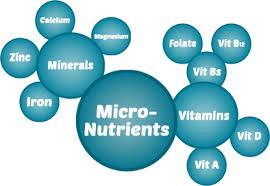
Vitamins
- Vitamins are essential compounds that play an important role in making our body function properly.
- Helping to fight infection.
- Wound healing.
- Making our bones strong and regulating hormones.
- Some of them are vitamin A, vitamin B, vitamin C, vitamin D, vitamin E, vitamin K, vitamin B-6, and vitamin B-12. We receive most of these vitamins daily.
- Our body naturally tends to produce vitamins like D and K.
Minerals
Compared to trace minerals, macrominerals are needed in greater quantities. The significant macrominerals and their roles comprise:
- Calcium: Essential for the healthy structure and operation of bones
- Phosphorus: A component of cell membranes
- Magnesium: Enzyme reactions
- Sodium: Blood pressure maintenance and fluid balance
- Chloride Promotes the production of digestive juices and maintains fluid balance
- Potassium: Muscle contraction and the transmission of nerve impulses
- Sulfur is a substance found in all living tissues
Water helps our body
- Keep a normal temperature.
- Protect your spinal cord and other sensitive tissues.
- Get rid of wastes through urination.
- Improve bowel movements.
What is a Balanced Diet?
- A balanced diet provides all the essential nutritional value of foodto the body in appropriate quantities necessary for its growth, repair, and maintenance. A well-rounded and balanced diet includes vegetables, fruits, grains, protein, and dairy.
- An adequate amount of carbohydrates, proteins, fibres, fats, vitamins, and minerals are essential to keep the body healthy and functioning correctly. Consuming a balanced diet regularly is crucial for promoting proper growth and development in children and maintaining an ideal weight, muscle tone, and immunity.
Importance of balanced diet in a healthy lifestyle
- The importance of a balanced dietcant be emphasized enough for a healthy lifestyle.A healthy lifestyle can be attained by maintaining abalanced dietand keeping into consideration to meet all the essential nutrients required by the body.
- A well-balanced diet has benefits for both physical and mental health.A proper meal plan helps to attain ideal body weight and reduce the risk of chronic diseases likediabetes, cardiovascular and other types ofcancer.
What Does a Balanced Diet comprise of?
- A balanced diet comprises a specified amount of nutrients, including carbohydrates, protein, and fats, in the ratio of CHO -50-60%,PROTEIN- 12-20%, and FAT-30%, respectively. In addition, such a diet should also include food items such as fruits, vegetables, grains, protein, and dairy products.
- The intake of a balanced diet ensures that one receives essential nutrients, vitamins, and minerals required by the body. Children especially need a balanced diet to promote proper growth and development. When planning your diet, choosing a variety of foods is essential to ensure your body acquires all the necessary nutrients.
Why ii it important to have a balanced diet?
- Improved Mental Health.
- Improved Physical Health.
- Increased Energy Levels.
- Better Digestion.
- Stronger Bones and Teeth.
- Improved Skin Health
Balanced Diet -Healthy Eating
- Eat Most – Grains
- Eat More – Vegetables and fruits
- Eat Moderately – Meat, fish,egg ,milk and milk products.
- Eat Moderately -Nuts
- Eat Less – Fat/ oil, salt and sugar
- Drink adequate amount of fluid (including water, milk, juice,clear soup, etc) every day
Common mistakes to avoid
- Skipping Meals
- Not Eating Enough Fruits and Vegetables
- Relying Too Much On Processed Foods
- Not Drinking Enough Water
- Consuming Too Much Salt
- Skipping Breakfast
- Consuming Too Much Saturated and Trans Fats
Fuel for the Future
- See a Registered Dietitian/Nutritionist
- Stay nourished and save money
- Eat a variety of foods from all food groups
- Make tasty foods at home
Eat with the environment in mind:
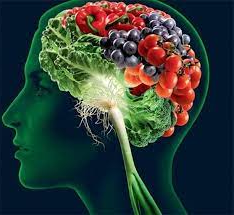
- Enjoy more plant-based meals and snacks
- Purchase foods with minimal packaging
- Buy foods in season and shop locally when possible
- Start a container or backyard garden to grow food at home
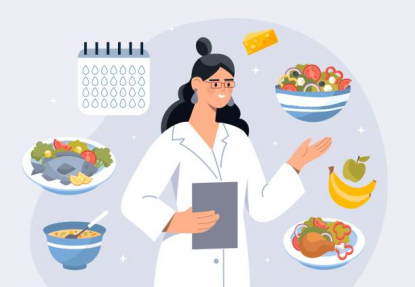
See a Registered Dietitian/Nutritionist (RDN)
- Ask your doctor for a referral to an Nutritionist
- Find an Nutritionist who specializes in your unique needs
- Learn how nutrient needs may change with age
- Receive personalized nutrition information to meet your health goals
Stay Nourished and Save Money
- Plan your meals and snacks
- See what foods you have at home before purchasing more
- Use a grocery list and shop sales when purchasing food
Eat a variety of foods from all food groups
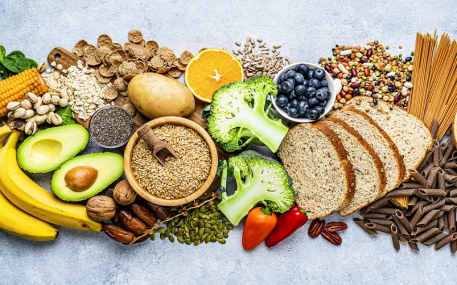
- Include your favorite cultural foods and traditions
- Eat foods in various forms including fresh, frozen, canned and dried
- Avoid fad diets that promote unnecessary restrictions
- Practice gratitude for your body by giving it the fuel it needs.
Make tasty foods at home
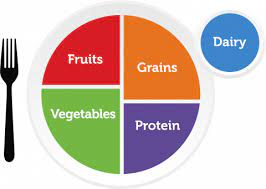
- Learn cooking and meal preparation skills
- Try new flavors and foods from around the world
- Find creative ways to use leftovers rather than tossing them
- Create happy memories by eating with friends and family when possible.
Reference
- Derrick. B. Jelliffe. The assessment of the nutritional status of the community (With specialreferenceto field surveys in developing regions of the World). World Health Organization, Geneva. 1966.
- Bamji MS., et al. Text book of Human Nutrition, New Delhi. Oxford & IBH Publishing Co. Pvt. Ltd. 2003;197-201.
- Srilakshmi. B. Nutrition Science, New Delhi. New Age International (P) Limited. 2005;3-14.
- https://byjus.com/question-answer/define-nutrition/
- https://www.vedantu.com/biology/nutrition.
- https://www.sciencedirect.com/topics/food-science/community-nutrition

